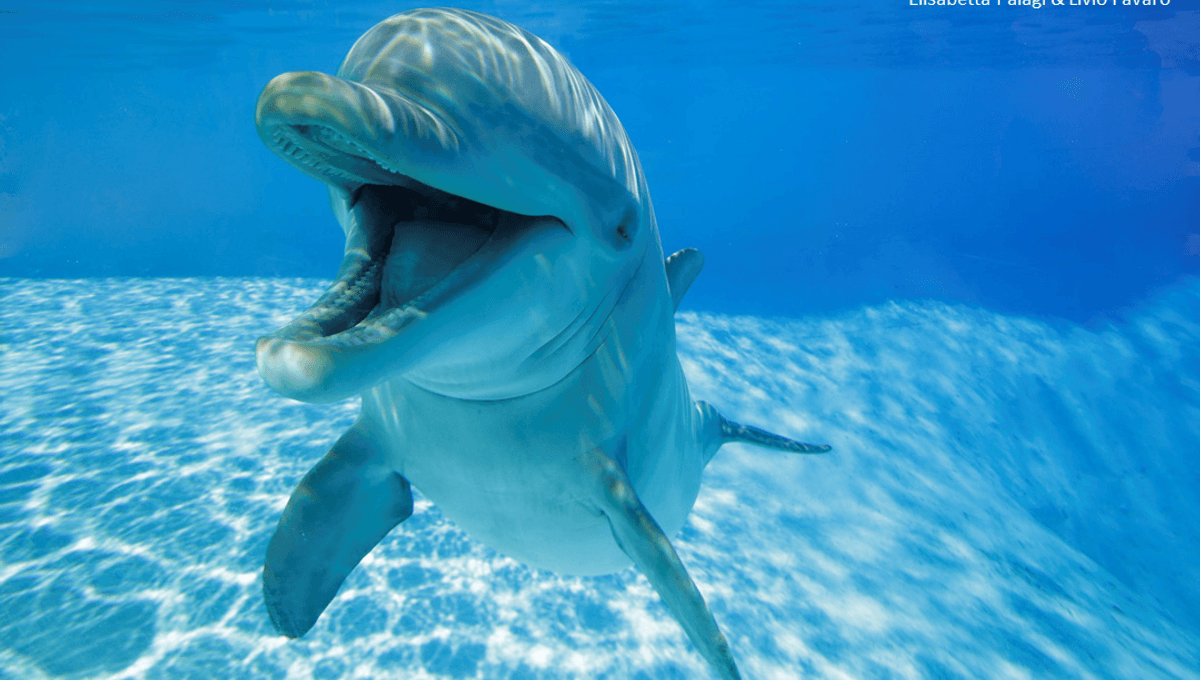
Dolphins open their mouths in what appears to us to be a smile when they are in the field of vision of others they like. Moreover, this smile is frequently reciprocated as a way for highly social animals to bond. The team who discovered this thinks it is no coincidence that the dolphin expression of fun resembles our own.
Humans love to anthropomorphize, attributing human-like thoughts and feelings to other animals, and even plants and rocks we like (or really don’t). Knowing this tendency, and that it is frequently wrong, often leads to the opposite extreme: Jane Goodall’s pioneering work on chimpanzee behavior was resisted because other scientists thought she was attributing too much human-like emotion to her study subjects.
In this context, there’s a tendency to read a lot into animals’ facial expressions. Sometimes this is wildly wrong, such as the portrayal of hippopotamuses in children’s literature as friendly creatures because their faces appear to be smiling, an impression quickly disabused by an encounter with one in the wild.
Bottlenose dolphins (Tursiops truncatus) are another animal whose anatomy creates a permanent apparent smile, a move that has contributed to their immense popularity, but this time it seems we got it right.
“We’ve uncovered the presence of a distinct facial display, the open mouth, in bottlenose dolphins, and we showed that dolphins are also able to mirror others’ facial expression,” said Dr Elisabetta Palagi of the University of Pisa in a statement.
Dolphins are also loved for their playfulness, sometimes to their detriment, as this has seen them be forced to perform to crowds and appear to enjoy it while being kept in unsuitable conditions for wild animals. Palagi noted that some dolphin play, like chasing and playfighting, could easily be misinterpreted as aggression. If humans make that mistake it would seldom matter, but if other dolphins are confused, the results could be disastrous. Dolphins need an equivalent of an emoji that tells others “Just kidding”.
To see how they convey this message, Palagi and colleagues studied 80 hours of film of 22 captive bottlenose dolphins at Planète Sauvage playing with others of their species, with human trainers, and on their own.
Of the 1,288 times the mouth was held deliberately open, 92 percent occurred during play with other dolphins. Moreover, dolphins are believed to have the theory of mind to understand what others can see, and mostly used the open mouth when in another’s field of view.
A third of the time when a dolphin saw another with a smile, they quickly smiled back. That might seem like a low hit rate, but for all its popularity in filmed representations of dolphins, the open mouth was rare enough that Palagi considers this a good response rate.
“Some may argue that dolphins are merely mimicking each other’s open mouth expressions by chance, given they’re often involved in the same activity or context, but this doesn’t explain why the probability of mimicking another dolphin’s open mouth within 1 second is 13 times higher when the receiver actually sees the original expression,” Palagi said.
The researchers hope to investigate correspondence between the smile and specific acoustic signals from dolphins’ large selection of vocalizations, as well as eye-tracking to catch any exchange of lingering glances.
Observing dolphins in the wild is naturally much more difficult, but would eliminate any concerns the dolphins got their expressions from interacting with humans, as dogs may have done over their much longer cohabitation with us. Still, that idea seems unlikely, since the dolphins seldom smiled when interacting with trainers, though Palagi and co-authors don’t seem to consider the possibility their subjects just don’t enjoy interacting with them enough to pull a grin.
Comparisons with other mammals represent another research opportunity. “Open-mouth signals and rapid mimicry appear repeatedly across the mammal family tree, which suggests that visual communication has played a crucial role in shaping complex social interactions, not only in dolphins but in many species over time,” Palagia said. “The open mouth gesture likely evolved from the biting action, breaking down the biting sequence to leave only the ‘intention to bite’ without contact.”
The same open-mouthed smile, or even laugh, is now seen not only in humans and our near relatives like monkeys, but in social carnivores like meerkats. “It is difficult to know whether such similarities derive from shared evolutionary pathways or from evolutionary convergence,” the authors write.
Nevertheless, this does mean that when you think your Cheshire cat or rabbit is smiling at you, you may just be right. But it’s still best not to trust those hippos (unless they’re Fiona or Moo Deng).
The study is published in iScience.
Source Link: We’re Not Imagining It, Dolphins Really Do Smile When Playing With Friends